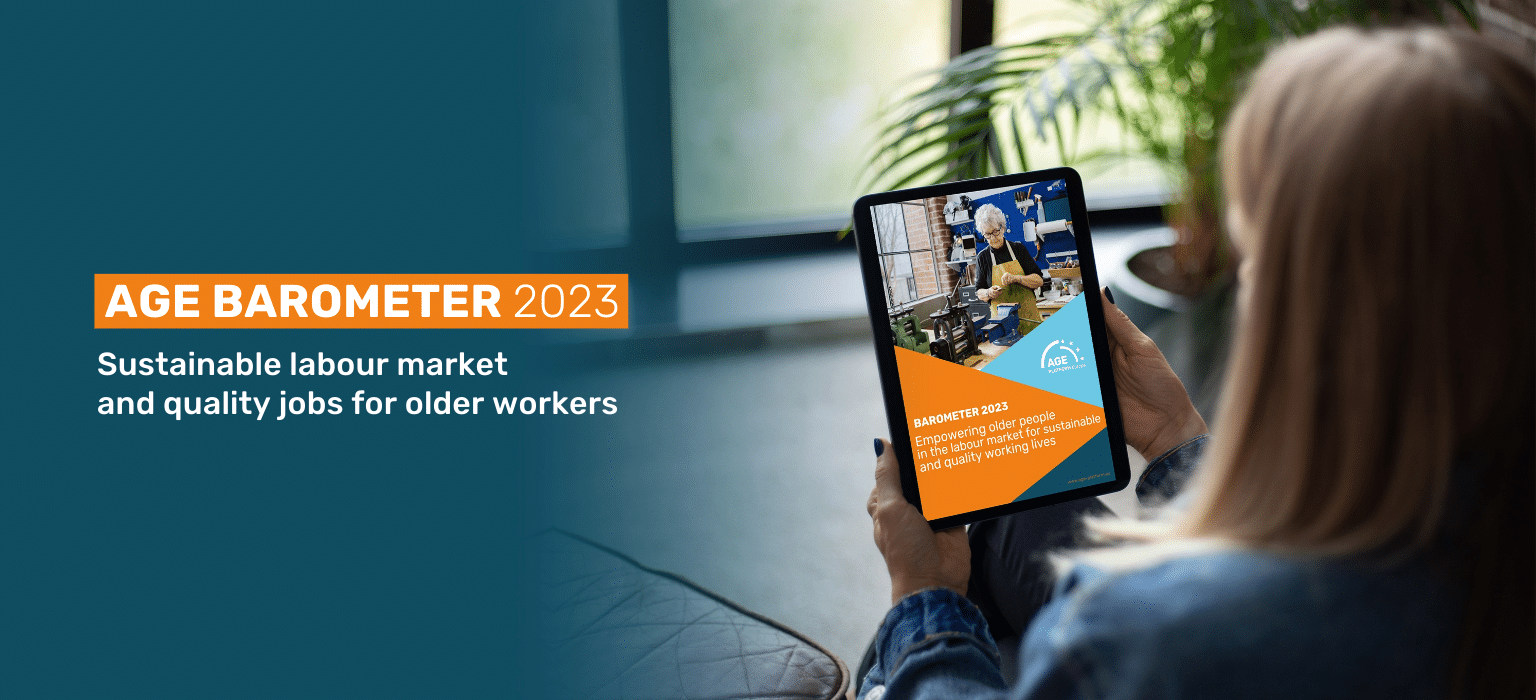Slovenia
Information provided by Zveza Društev upokojencev Slovenije (ZDUS) and desk research

Support in the labour market
With an employment rate (from 20 to 64 years) of 77.9%, Slovenia is above the EU average of 74.6%. However, the specific employment rate for people between 55 and 64 years old (55.2%) is well below the EU average (62.3%), reflecting an inadequate approach to the retention and/or integration of older people in the labour market. However, some measures and good practices have been put in place to reverse this ratio.
The Labour Market Regulations Act offers lifelong career guidance and includes services explaining the current labour market situation, but also deals with independent career management, basic career guidance, in-depth career guidance and learning career management skills. Career guidance, with all the elements of career planning and management, is provided mainly to the unemployed and young people, and is provided by the Employment Service for Employment, the Republican Institute with municipal and regional units throughout Slovenia.
To protect older workers from unemployment, the Employment Relationships Act provides in Article 114 that the employer may not terminate the employment contract of an employee who has reached the age of 58. The law also provides for some exceptions to this general provision.
AGE’s Slovenian member, ZDUS, offers different types of training in its programme, which includes education, maintenance and updating of skills and abilities, and training in the use of digital resources, tools and programmes. There are also programmes to support older jobseekers issued by the Employment Agency, which implements active employment policy measures in Slovenia. These include encouraging employers to take on older workers by offering financial support to employers that employ long-term unemployed people and providing training to older workers, including practical ones to enable them to take up future jobs.
Support to prepare for retirement is offered in certain sectors. This is the case in the Ministry of Defence with regular courses and occasional seminars for soldiers and police officers. The Association of Retired Pedagogues also offers annual courses. This year, AGE member ZDUS is campaigning with all ministries to make retirement preparation a legal obligation for all employers.
The possibility of working for pensioners is defined by the Labour Market Regulations Act, the Labour Relationships Act and the Pension and Disability Insurance Act, and to a lesser extent by the Occupational Safety and Health Act. Working after the statutory retirement age is possible, but there are limitations on pension payments and the work must be temporary or occasional, according to the Labour Market Regulations Act.
The law states that a pensioner may work a maximum of 90 hours per month, or exceptionally 120 hours per month up to three times a year, with the sum of all temporary and casual work adding up to a maximum of 1080 hours per year. It is possible to work for several employers at the same time, but in total the pensioner must not exceed the prescribed limit on the number of hours and the amount of income. Based on this work, a pensioner is not required to have pension and disability insurance, the additional income does not affect the pension, but there may be an increase in income tax.
The Slovenian Constitution provides equal opportunities for men and women. This obligation is reiterated in the Employment Relationships Act, the Labour Market Act, and the Framework Act on Protection against Discrimination of 2016.
Nevertheless, the wage gap in Slovenia is a reality. Data from the Slovenian Association of Free Trade Unions show that the biggest difference between the incomes of men and women is in the financial and insurance sector (men are paid 24.5% more than women), health and social care (23.2%) and education (16%). The difference in wages then continues even in retirement, which results in the feminization of poverty in Slovenia, where the difference in pensions currently stands at 24% and every third woman over 70 lives in poverty.
The growth of the pay gap indicates the deterioration of the position of women in the labor market and the increase of gender inequality in society.
Age discrimination in employment
The European directive 2000/78/EC is translated into the Employment Relationships Act. The Act prevents direct and indirect discrimination and stipulates that the employer and employee are obliged to comply with its provisions. It also contains provisions on the employer’s liability for compensation in the event of discrimination.
The legal definition based on the directive has raised awareness of discrimination in general in Slovenian society. AGE’s Slovenian members deplore a lack of awareness among workers of their rights, the difficulty of identifying different forms of discrimination and a form of internalised ageism. Despite the support of trade union representatives, the Slovenian members of AGE recommend an increase in individual assessments of a worker’s abilities and skills to emphasise the equal value of a job regardless of age.
In 2021, the Slovenian Presidency of the Council of the EU organised a conference on the theme: “Human rights for all ages: a challenge to be met”. It was pointed out that ageism is widespread in institutions, laws and policies around the world and has serious consequences for both older people and society.
In the framework of the Comprehensive Support for Actively Ageing Workforce (ASI) project, a national campaign “Stari, imava problem. ASI za rešitev?” (“Old dude, we have a problem. Should we solve it?”) was developed to combat age-related prejudice and discrimination in the workplace. The campaign aims to change attitudes and beliefs towards older workers, eliminate negative stereotypes and recognise the benefits older people bring to the workplace.
There is also a project SODELOVALNICA (“collaboratory”), co-financed by the Republic of Slovenia and the European Union within the framework of the European Social Fund, which aims to reduce and eliminate intergenerational stereotypes and promote intergenerational cooperation in the workplace, with the aim of raising awareness, educating, and providing appropriate support to employees and employers. The project aims to overcome conflict situations that arise between employers, older and younger workers. It offers educational workshops on these issues and awards MEGA (Intergenerational active company) prizes to employers who are actively working towards intergenerational cooperation in the workplace.
Workplaces for all ages
In Slovenia, the Ministry of Labour, Family, Social Affairs and Equal Opportunities has proposed the project ‘Comprehensive Support for Actively Ageing Workforce’ (ASI), which aims to extend the working life of older workers, strengthen their skills, overcome stereotypes about older workers, equip employers with the skills to manage an ageing workforce and delay retirement. Managed by the Public Scholarship, Development, Disability and Maintenance Fund of Slovenia, the ASI project provides workshops for employers and employees to learn good practices and work on concrete cases.
As part of this project, a special catalogue intended for companies, employers and employees offers a list of measures to be taken in the areas of health promotion and protection, ergonomics, the adaptation of work and working hours and staff development. Among the measures dedicated to older workers, the catalogue suggests taking several shorter breaks; a “smooth” return to the workplace after an extended period of sick leave; shorter exercises are organised in the workplace, adapted to individual groups of employees and the nature of their work. The catalogue also suggests that the company organises workshops on healthy ageing, where older employees learn the importance of a healthy lifestyle and what they can do to be healthy.
The Occupational Health and Safety Act requires the employer to adopt measures to prevent, eliminate and manage cases of violence, mobbing, harassment, and other forms of psychosocial risks at the workplace that may pose a threat to the health of workers. The employer must designate one or more safety officers from among its workers to carry out tasks such as: coordinating measures for the prevention of psychosocial risks; establishing the professional basis for the safety declaration; carrying out periodic inspections of the harmfulness of the working environment; carrying out internal control of the implementation of measures for safe working practice; drawing up instructions for healthy and safe working practice.
In 2020-2021, the National Institute of Public Health conducted a project entitled “PKMO – Promotion of activities for the prevention of musculoskeletal diseases and psychosocial risks at work”. The project activities were aimed at workers over 45 years of age, to raise awareness, prevent and control them thanks to an online tool and an e-manual.
The Star Vital project proposes several combined measures for the vitality of older workers, the main objective of the project being to create a healthy workplace, where employees and employers work together to improve health protection and promotion, to ensure sustainable employment, health, and well-being of employees. Also, the project “Polet – Prolonging working life and reducing absenteeism” proposes a comprehensive business model for employers for active and healthy ageing of employees. The project develops a strategic online platform for the management of older workers in companies, which will help employers to plan, implement and evaluate measures for the treatment of older employees and to reduce absenteeism.
Finally, the e-VZD project – Training of employers to promote safety and health at work – aims to raise the level of safety and health at work in companies, with a focus on employees over 45. Through a public call the project selected 20 organisations to receive funds to implement specific workplace adaptations for workers, including the oldest and most exposed in terms of the number of occupational accidents (manufacturing activities, transport, and storage for instance).
Milan, male, 76 years, on “What is ageism to you?”
“When you are old, you feel like you are no longer needed.”
“When you are old you feel like you bother young people, you feel like you have done your job, you feel like you disturb progress of young people who live differently. It’s like with old things, when you no longer need them, you put them away … When a person retires, he/she has the right to maintain his/her socio-economic position as it was during the working period. We should have the right to be included in society and to decide about our own social status in society.”
Tatjana, female, 55 years, Slovenia, on access to work for older people
“I am an active job seeker, just before my retirement, also facing health issues … I have sent a lot of job applications, but employers simply do not reply to any of them. I have come to realize that the knowledge and experience of older people are not being considered and valued at all. Employers only seek a young labour force. Any work is honourable work. We, older people, would also like to be treated equally, so we can have a decent life.”
This country assessment is part of the 2023 edition of AGE Barometer dedicated to employment, which you can download below. Find out more online here.
COUNTRY ANALYSIS
Contact

Sarah Loriato
Policy Officer on Employment and European Parliament Liaison
Sarah is in charge of AGE’s policy activities in the fields of employment, participation and active citizenship in old age. She also monitors EU initiatives on volunteering for older people and lifelong learning. She is responsible for the Task Force dedicated to on Employment, participation and active citizenship. Sarah also coordinates AGE’s relations with the European Parliament (EP).



